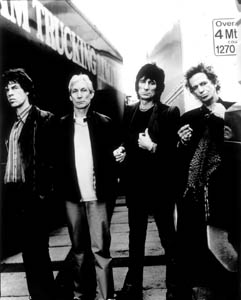![[Metroactive Music]](/music/gifs/music468.gif)
[ Music Index | Silicon Valley | Metroactive Home | Archives ]
 The Stones gather enough moss to open a swamp.
The Stones gather enough moss to open a swamp.
Paint It Black Biographer Stephen Davis lets the Rolling Stones' legacy bleed By Gina Arnold IF THE WORLD turns Muslim in the near future, Rolling Stones biographer Stephen Davis better watch his back--in Islamic eyes, his entire career is blasphemy. The man believes in multiple gods, and he believes that rock stars embody them. In The Hammer of the Gods, his landmark biography of Led Zeppelin, he merely posited that those gods had it in for Page, Plant, Jones and Bonham because they (the Zep) were their (the gods') rivals. In his latest, appropriately titled, Old Gods Nearly Dead: The 40-Year Odyssey of the Rolling Stones (Broadway Books), the gods are the Rolling Stones, each of whom embodies the role of an ancient god like Adonis (Mick), Pan (Brian Jones) and Dionysius (Keith Richards). Band bios are a dime a dozen, but Davis' are peculiarly readable. This one comes just in time, since the Stones are about to go on tour once again. If you read it, you can make your own decision, but surely Old Gods Almost Dead proves that any money spent on seeing them live would be essentially thrown away. Incidentally, the title of the book comes from a Robert Graves poem titled "Outlaws," which ends with the words "Proud gods, humbled, sunk so low / living with ghosts and ghouls, and ghosts of ghosts and last year's snow / and dead toadstools." Few prologues have ever been so apropos. The Stones are the perfect subject. Even if they didn't embody the vices of various Roman gods, their history spans a fascinating time in the 20th century, and Davis is good at placing them in context. His book begins on the Mississippi Delta in 1941, where Muddy Waters is writing the blues, then jumps to London where the Stones themselves are being born during the Blitz. He describes the politics, the pop art and the cultural movements that made swinging London happen. Despite his tendency to elevate the Stones' importance in the mix--according to him, Bob Dylan wouldn't have gone electric without them--the times themselves are a story well worth reading about. At least, until 1970, that is. Then--just like the Stones' career--things fall apart. It takes Davis 375 pages of a 550-page book to get to 1969, and the '90s only begin well after page 500. The book's chronology stands as an indictment of the Stones' irrelevance and the crappy work they've done in the last three decades. Davis, who's obviously a huge Stones fan, can't muster any interest in that work. Instead, he, like many a middle-aged man, seems most interested in the Stones' sexual prowess, which he both admires and frowns upon. He gasps with admiration at the redoubtable Brian Jones' ability to "make a girl pregnant just by looking at her." He recounts girlfriends, blowjobs, orgies--couching everything in relentlessly quasi-learned terms. In short, in his mind, the Stones (at least in their early days) were walking, talking erect penises. His favorite is, of course, the most evil, vain and worthless one, Jones. Davis portrays Jones as one of the most despicable human beings ever, but he seems to have some weird sympathy for him. After him comes Keith, whom Davis also clearly worships: if the book can be said to have a hero, it's Richards, although why is unclear. Most of Davis' authorial ire is reserved for Mick Jagger, whom he despises, though why he thinks Jagger is worse than the others is hard to fathom. As the book progresses, the Stones do wickeder and wickeder things--from stealing Ry Cooder's riffs without credit on Let It Bleed to beating up women in Winnie the Pooh's house to Jagger's splendidly chilly attempt to illegitimize his own children. Also, the Stones, Davis informs us, haven't written a good album since 1972. They appear onstage drunk, drugged and bored, and they only regrouped in 1985 because it meant a $7 million payday each. And yet, while nicer and worthier peers (George Harrison comes to mind), drop like flies, the Stones continue to prosper. According to Davis, this is because they are gods, but if you don't buy that, you have to wonder. Maybe it's because there isn't one. If the Stones' current shows sell out, we'll know for sure.
Send a letter to the editor about this story via email . [ Silicon Valley | Metroactive Home | Archives ]
|
From the August 15-21, 2002 issue of Metro, Silicon Valley's Weekly Newspaper.
Copyright © Metro Publishing Inc. Metroactive is affiliated with the Boulevards Network.
For more information about the San Jose/Silicon Valley area, visit sanjose.com.